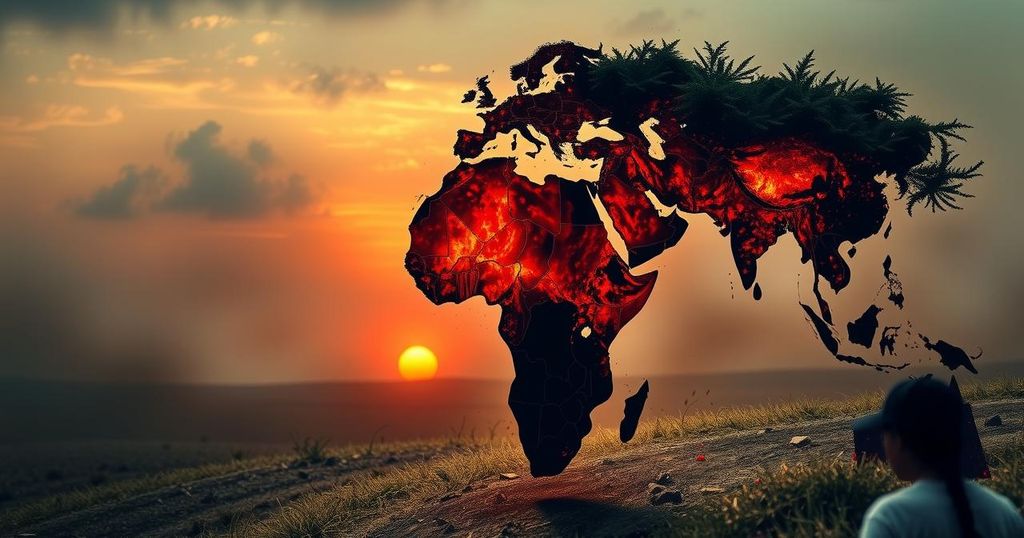Africa’s Unprecedented Crises in 2024: Climate Change, Health, and Conflict
In 2024, Africa faced severe challenges including climate change, mpox outbreaks, and armed conflicts, threatening millions. A dam failure in Nigeria displaced many, while Somalia dealt with a massive drought. The migrant crisis saw over 10,000 deaths. Experts highlighted the need for improved governance and international support to tackle these interconnected crises effectively.
In 2024, Africa encountered a multitude of profound crises driven by climate change, migrant accidents, mpox outbreaks, and persistent armed conflicts. Tragically, these circumstances have jeopardized the livelihoods of millions across the continent. Rising temperatures, intense droughts, and devastating floods have led to significant loss of life and displacement, particularly illustrated by a catastrophic dam failure in northeastern Nigeria in September that affected one million individuals and resulted in at least 37 fatalities.
Somalia, facing the harshest drought in decades, has seen 6.9 million people in dire need of humanitarian assistance, making it the hungriest nation according to the 2024 Global Hunger Index. Concurrently, the tragic plight of migrants fleeing violence and economic distress continues, with recent statistics revealing that over 10,457 migrants died attempting to reach Spain by sea, stressing the immediate need for safer migration channels and humane border management.
Additionally, the emergence of mpox has marred several African nations, with Congo bearing the brunt of this public health crisis. The World Health Organization declared it a public health emergency in August, noting over 1,300 suspected deaths. Amid these health challenges, Africa also endures systemic armed violence, with more than 35 documented non-international conflicts across various nations, including Burkina Faso, Cameroon, and Sudan, resulting in thousands of fatalities and widespread economic devastation.
Experts emphasize that inadequate governmental investment in climate resilience and security measures continues to exacerbate these conditions. Kazeem Olalekan, a noted security and climate researcher, remarked on the failure of political leaders to properly address the significant proliferation of small arms and prioritize the well-being of their populations. He called for enhanced health provisions and a focus on making lives more affordable and secure for citizens.
There is an urgent appeal from experts for the international community to intensify its efforts in facilitating peace initiatives, promoting sustainable agricultural practices, and engaging communities to effectively respond to health crises like mpox.
Africa is grappling with multifaceted challenges that have intensified in 2024, prominently characterized by climate change, migrant hardships, public health emergencies, and rampant conflicts. The continent’s vulnerability to climate events like droughts and floods has resulted in disasters that displace vast populations while exacerbating hunger and health crises that require prompt attention. The increase in migrant accidents underscores the desperation stemming from conflicts and economic turmoil, highlighting the urgent need for humanitarian intervention and safe migration policies. Additionally, the rise in mpox cases necessitates significant public health responses, particularly concerning countries like Congo that are experiencing extreme outbreaks. The prevalence of armed conflicts exacerbates these crises, underscoring the complex interplay between environmental, social, and political factors affecting Africa.
In conclusion, the year 2024 has witnessed Africa confronting an amalgamation of crises that have severely impacted its populations. The intersection of climate change, health emergencies like mpox, and armed conflicts calls for immediate action from African governments and the international community. There is a pressing need for enhanced investment in sustainable practices, comprehensive health care, and humanitarian policies that prioritize the welfare of citizens. The continuation of these crises poses a significant threat to stability and livelihoods on the continent, necessitating united and concerted efforts to mitigate their effects and foster resilience.
Original Source: www.aa.com.tr




Post Comment